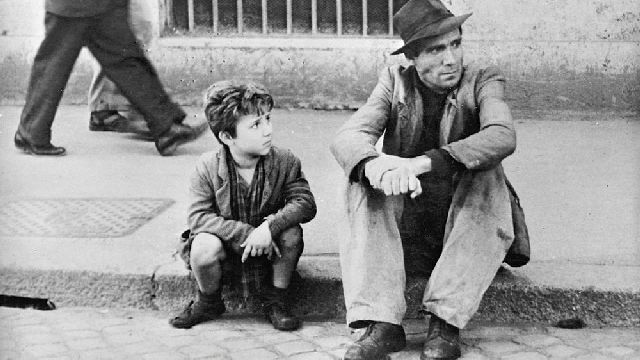Bicycle Thieves (1948) 

Director: Vittorio De Sica
Cast: Lamberto Maggiorani, Enzo Staiola, Lianella Carell
Synopsis: A man and his son search for a stolen bicycle vital for his job.
When watching a bona-fide humanist classic such as Vittorio De Sica’s Bicycle Thieves, it’s difficult not to reflect on whether directors of risk-managed, computer-generated tent-pole blockbusters ever watch films like this with a sense of guilt or shame. Because if Bicycle Thieves proves anything, it’s that all a real story-teller needs to create a deeply affecting tale is a belief in the ideas they are trying to express. The wealth of meaning and emotion contained within the simplicity of Bicycle Thieves’ storyline is what makes it both great and timeless.
Lamberto Maggiorani (Umberto D.) plays Antonio Ricci, one of an army of unemployed in the grinding poverty of Post-war Italy. One day, a miracle occurs, and he is offered a job hanging posters — on the condition that he provides his own bicycle. Ricci has a bicycle, but it’s in the pawn shop, and his wife Maria has to pawn the sheets from their bed to raise the money needed for him to get his bike out of hock. Duly equipped, Antonio embarks on his first day of work — the first poster he hangs is of Rita Hayworth in Gilda, an image of glamour as far removed from Italy’s neo-realism movement as it is possible to get — only to have his bike stolen. Unable to work without it, Antonio recruits the help of a friend and his workmates to scour Rome’s bike markets in a futile attempt to track the bike down. When his friends are unable to locate the bike, Antonio continues his search with the help of Bruno (Enzo Staiola), his small son.
Even a story as simple as Bicycle Thieves doesn’t hold water under close scrutiny — the likelihood of Antonio stumbling across the thief in a city the size of Rome is too tiny to be believable — but sometimes it’s necessary to permit such liabilities to be taken in order to benefit from a director’s vision. Ricci is desperately poor – his and Bruno’s tattered clothes attest to their impoverishment — but a scene in which he and a policeman carry out a search of the single room in which the suspected thief and his family live shows us that he is comparatively well-off compared to the thief.
By the end of the film, Antonio’s desperation lead him to attempt stealing someone else’s bike, thus continuing a ceaseless cycle of theft, a product of necessity rather than greed or malice. The idea that poverty breeds theft is nothing new — although it’s more fashionable today to claim that poverty breeds an expensive drug habit which requires constant funding — but that makes it no less true, which means its relevance is as legitimate today as it was back in 1948. But Bicycle Thieves takes the time to demonstrate how even decent, honest people who want to work for a living can be driven to crime by desperate times. The tragedy of Bicycle Thieves isn’t the plight of Antonio and little Bruno, but of the nation as a whole.
(Reviewed 20th October 2012)
httpv://www.youtube.com/watch?v=HjZI2YN0ueY
